In November and December 1943, American and British leaders, including President Franklin Roosevelt and Prime Minister Winston Churchill, met with Chinese President Chiang Kai-shek and Marshal of the Soviet Union Joseph Stalin, but not at the same time. The first of these three conferences was in Cairo, Egypt, November 22-26 with Chiang, the only one of these wartime international conferences he attended.
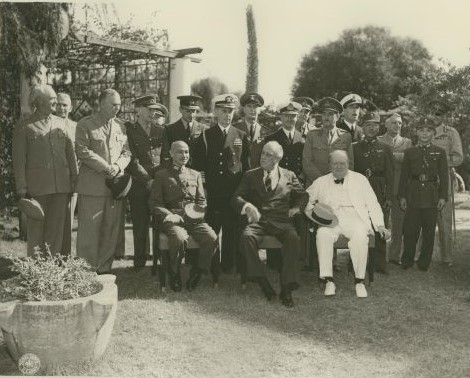
The attendees of the first Cairo Conference. Chiang, Roosevelt, and Churchill are seated; Gen. Marshall is at left.
The United States wanted Chinese cooperation in a major offensive, Tarzan, in northern Burma early in 1944 to protect the “Hump” air routes and to help open the Burma Road. Gen. George Marshall commented in a Joint Chiefs meeting on Nov. 23 that this “constituted a milestone in the prosecution of the war in the East.” Another operation, Buccaneer, an amphibious assault on the Japanese-held Andaman Islands, was discussed.
The main topic discussed at this meeting was the future of operation Overlord, the cross-Channel invasion of northern France, and the discussions were not always peaceful. In fact, on Nov. 23 and Nov. 26, the discussions became heated. Before Overlord, the British wanted to invade the Mediterranean Island of Rhodes; Marshall angrily said that no United States forces would participate in that action. He was very worried about operations in the Mediterranean delaying Overlord, as there was a shortage of landing craft in the European theater. He was also concerned that Stalin would support the British in the Mediterranean rather than Overlord.
There was also debate on Supreme Allied Commander for Overlord; the British wanted command of the Mediterranean to be British and not subordinate to the Supreme Allied Commander responsible for the invasion of France.
On Nov. 28, the British and American contingents met with Stalin in Tehran. The first session was so hastily organized that Marshall and Gen. Arnold were still touring the mountains near Tehran! At this session, Stalin confirmed that the Soviet Union would join in the war against Japan after Germany surrendered. He also surprised the British and Americans by saying that Overlord should be the main Allied focus in Europe.
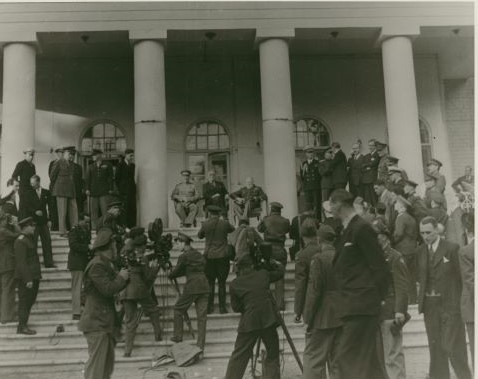
Stalin, Roosevelt, and Churchill at the Tehran Conference. Marshall is on the left.
The next day, Marshall had an interesting exchange with Stalin’s military adviser, Marshal Kliment Vroshilov, who suggested that Soviet success in river crossings could be an example to the Allied invasion of France. Marshall noted that “the difference between a river crossing however wide, and a landing from the ocean is that the failure of a river crossing is a reverse while the failure of a landing operation from the sea is a catastrophe.”
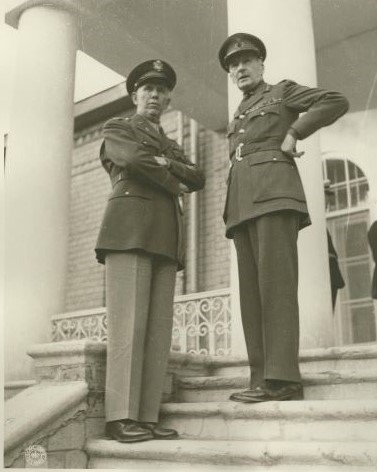
Marshall and Field Marshal Sir John Dill, British liaison to the Combined Chiefs, at Tehran.
Having indicated his support for Overlord, Stalin wanted a quick decision made on who would command the operation and when it would take place. He agreed with the British that there should be a coordinated operation in southern France. In a Combined Chiefs conference on Nov. 30, the first serious discussions of the southern France operation, code named Anvil, took place. The shortage of landing craft in Europe was the sticking point for both of the French operations to take place simultaneously. It was agreed that Overlord would happen by June 1, and Stalin promised a Soviet offensive to tie up German troops at that time.
On Dec. 1, the British and American delegations left to return to Cairo. On the way, they stopped for a day in Jerusalem, where they were able to visit some holy sites.
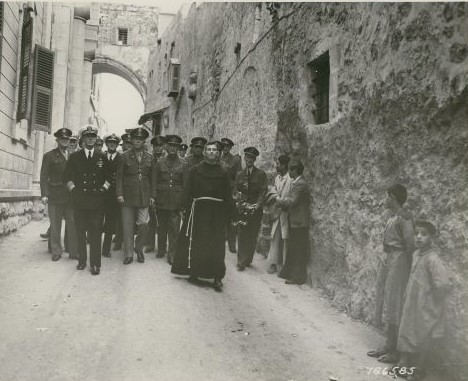
The Combined Chiefs in Jerusalem.
The second Cairo conference took place Dec. 2-7. There were two big questions to address: How would Overlord/Anvil relate to Buccaneer/Tarzan and actions in the Mediterranean with regard to allocation of landing craft? And who would lead Overlord?
The need for landing craft in Europe led to the cancellation of operation Buccaneer by President Roosevelt. This in part led to the decline of Chinese participation in the war, and the subsequent rise of the Soviet Union in the Far East during the last months of the war.
It had been assumed that Marshall would lead Overlord, but President Roosevelt was having second thoughts. Admirals Leahy and King didn’t want Marshall to leave Washington, D.C., as they felt he was more valuable to the war effort there. Marshall later said:
[Presidential advisor] Harry Hopkins came to see me one night before dinner and told me the President was in some concern of mind over my appointment as Supreme Commander. I could not tell from the Hopkins’ statement just what the President’s point of view was and in my reply I merely endeavored to make it clear that I would go along wholeheartedly with whatever decision the President made. He need have no fears regarding my personal reactions. I declined to state any opinion.
The next day, Marshall was invited to visit with the President, and was asked the same question. Marshall gave the President the same response he’d given to Hopkins. He stated, “I merely wished to make it clear that whatever the decision, I would go along with it wholeheartedly; that the issue was too great for any personal feelings to be considered. As I recall, the President stated in completing our conversation ‘I feel I could not sleep at night with you out of the country.’”
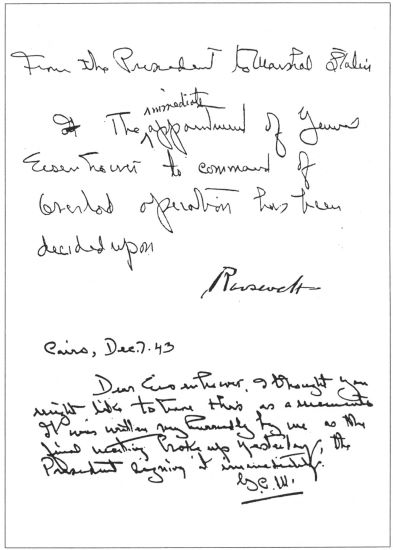
Note written by Marshall and signed by President Roosevelt that Marshall gave to Eisenhower.
On Dec. 6, Churchill and Stalin were informed that Gen. Dwight D. Eisenhower would assume the position of Supreme Allied Commander and lead the cross-Channel invasion of France.
Melissa has been at GCMF since fall 2019, and previously was an academic librarian specializing in history. She and her husband, John, have three grown children, and live in Rockbridge County with three large rescue dogs. Keep up with her @MelissasLibrary.
